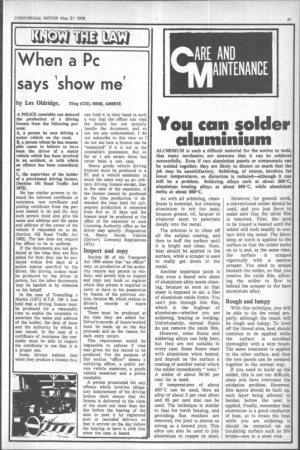When a Pc says 'show me'
Page 45

If you've noticed an error in this article please click here to report it so we can fix it.
by Les Oldridge, TEng (CEI), MIMI, AMIRTE
A POLICE constable can demand the production of a driving licence from the following persons: A, a person he sees driving a motor vehicle on the road; B, a person whom he has reasonable cause to believe to have been the driver of a motor vehicle which has been involved In an accident, or with which an offence has been committed; or C, the supervisor of the holder of a provisional driving licence. (Section 161 Road Traffic Act 1972).
He has similar powers to demand the relevant certificate ot insurance, test certificate and plating certificate from the persons named in (a) and (b). Any such person must also give his name and address and the name and address of the owner of the vehicle if requested so to do. (Section 162 Road Traffic Act 1962). The law does not require the officer to be in uniform.
If the documents are not produced at the time they are first asked for then they can be produced within five days at a police station specified by the driver, His driving licence must be produced by the driver in person, but the other documents may be handed in by someone on his behalf.
In the case of Tremetling v Martin (1971) R,T.R. 196 it was held that a driving licence must be produced for a reasonable time to enable the constable to ascertain the name and addreas of the holder, the date of issue and the authority by whom it was issued. In the case of a certificate of insurance the constable must be able to 'inspect the certificate to see that it is a proper one.
Some drivers believe that when they produce a licence clizv can hold it in their hand in such a way that the officer can read the details but not actually handle the document, and so not see any endorsement. I do not subscribe to this view as I do not see how a licence can be "examined" if it is not in the constable's possession. But so far as I am aware there has never been a test case.
Heavy goods vehicle driving licences must be produced to a PC and a vehicle examiner in much the same way as an ordinary driving licence except, that in the case of the examiner, it the licence cannot be produced at the time production is demanded the time limit for subsequent production is extended from five to 10 days and the licence must be produced at the office of the examiner or such Licensing Authority office as the driver may specify. (Regulation 14, Heavy Goods Vehicle (Driver's Licences) Regulations 1974.)
Inspect and copy
Section 99 of the Transport Act 1968 states that "an officer" may, on production of his authority require any person to nroduce, and permit him to inspect and copy any book or register which that person is required to carry or have in his possession by reason of the previous section, Section 98, which relates to driver's records of hours worked.
These must be produced at the time they are asked for, Driver's records of hours worked must be made up as the day proceeds and as the reason for each entry occurs.
This requirement would be impossible to enforce if time was given for the record to be produced. For the purpose of this section "officer" means a certifying officer, a public service vehicle examiner, a goods vehicle examiner and a police constable.
A person prosecuted for any offence which involves obligatory endorsement of his driving licence must ensure that the licence is delivered to the clerk of the court not later than the day before the hearing of the case or post it by registered post or recorded delivery so that it arrives on the day before the hearing or have it with him when the case is heard.
































































































